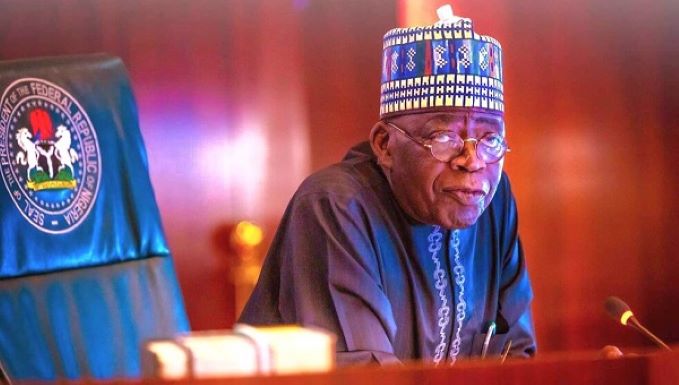

Dr Chinyere Almona, Director General, Lagos Chamber of Commerce and Industry (LCCI), has described the economy, under the Present Bola Tinubu’s administration, as one in adjustment mode to several variables.
Almona made this assertion in the LCCI Scorecard Report obtained by the News Agency of Nigeria (NAN) on Tuesday in Lagos.
According to her, the Nigerian economic outlook in the last one year was defined with variables like stubborn inflation, persistent naira weakening, supply chain disruption driven by insecurity and a weak production base.
She, however, noted that while policy choices have been liberal on the sides of the monetary and fiscal authorities, expected outcomes have not been recorded yet.
She said that some bold decisions were taken at some point with sincere intentions of fixing structural deficiencies.
Tinubu anniversary: Signs of good things to come – Iwuanyanwu
They include significant decisions to remove fuel subsidies, harmonise official and parallel exchange rates, and adopting a cost-reflective electricity tariff, among others.
Almona stressed that there was now a need for a systematic review and evaluation of these policies to achieve the best-desired outcomes.
“Looking at the Gross Domestic Product(GDP), the leading economic performance indicator, we can make a favourable comparison between the GDP recorded in the first quarter of 2024 (2.98 per cent and 2.31 per cent in the corresponding period of 2023).
“We understand that generally, the beginning of any year presents with slow growth dynamics which are expected to pick up in subsequent quarters.
“However, if must achieve the government’s target of 3.37 per cent, we must address issues around power supply, rising cost of production, foreign exchange illiquidity and its impact on imported raw materials for manufacturers.
“We must make better choices of monetary instruments, and deal with the security challenges that hitherto have impeded agricultural production and supply chain disruptions,” she said.
On inflationary pressures, Almona noted that the fight against inflation had not been successful, as the prices of goods kept an upward trend.
The inflation rate went from 22.22 per cent in April 2023 to 33.69 per cent in April 2024, recording more than a 10 per cent leap in twelve months.
She noted that attempts to curb flaring inflation by the Central Bank of Nigeria, through the instrument of rate hikes has made borrowing costlier and constrained new credit for productive activities.
This development, the LCCI DG, said, had continued to weaken the country’s production base and impede new job creation in the economy and worsening the Nigerian economic outlook.
She said the LCCI had consistently advised that rate hikes only would not curb inflation without a corresponding fiscal intervention targeted at boosting agricultural production and industrial manufacturing.
“We would continue to advocate concessionary interventions for Small and Medium Enterprises (SMEs) in Nigeria in the face of shrinking credit to the private sector,” she said.
On the fiscal policy and government finance, Almona noted that the Tinubu administration had made strides in fiscal consolidation by reducing the budget deficit to 4.5 per cent of GDP from 5.7 per cent the previous year.
She observed that the public debt levels remained high at 34 per cent of GDP, though manageable within the current fiscal framework.
On taxes and levies, the LCCI Director General noted that the government was trying to establish a better tax system that captured more people into the tax net and harmonised taxes to a single number.
She said that the recent establishment of a single window project was expected to drive the ease of doing business in Nigeria.
“Establishing the Presidential Committee on Tax Reforms and Fiscal Policy has been evaluated as the government’s commitment to building a new tax system for a thriving business environment.
“The advent of a single window will ease transactions from one portal, make permits and licenses cheaper, and less prone to corrupt tendencies,” she said.
Almona said the manufacturing sector in Nigeria had shown resilience and growth amidst recent reforms and government interventions aimed at fostering economic development and industrialisation with the Nigerian economic outlook still holding some promise.
She noted that the sector experienced fluctuations in growth rates throughout the quarters of 2023 and the first quarter of 2024, reflecting both challenges and opportunities.
The LCCI Director General urged the government to fix the foreign exchange crises, a adopt lower exchange rate for import duties on imported raw materials for manufacturing.
She added that the government should consider offering manufacturers concessionary interest rates in the face of shrinking credit top the private sector, and ensure that the policy environment is stable and predictable.
Almona said that the agricultural sector in the first year of President Tinubu’s administration was impacted mainly by insecurity, fuel subsidy removal, and consistent exchange rate deprecation, which increased the cost of fertiliser and other input costs.
She said that some parts of the country recorded the worst flooding in history in the last quarter of 2023, significantly affecting crops such as rice, maize and soybeans.
She noted that the economic conditions have also been difficult for livestock producers and animals suffering from the high feed cost, and herder-farmer crisis, among others.
“As a result of the challenging conditions, the Federal Government declared a state of emergency on food production to stabilise prices.
“It implemented several intervention policies, including distributing N100 billion fertilisers to boost food production.
“However, affordable food is still a far cry. According to NBS, food inflation has consistently increased over the last twelve years, reaching 40.53 per cent in April 2024 compared to 24.82 per cent in May 2023.
“To address low agricultural output, we recommend that the government address the country’s high level of insecurity and the exchange rate crisis.
“In addition, the government must incentivise agricultural processing and invest in vital infrastructure such as power and transportation,” she said.
As recommendations, Almona emphasised the need for the government to strengthen monetary policy by enhancing coordination between fiscal and monetary policies to better control inflation.
She called for continued tax reforms and improved compliance to increase government revenue so as to brighten the Nigerian economic outlook.
Almona also noted the need to invest in non-oil sectors to reduce dependency on oil revenues, build economic resilience, improve infrastructure and implement targeted programs to reduce youth unemployment by supporting SMEs.
“By addressing these recommendations, the Tinubu administration can build on its initial successes and foster a more robust and inclusive economic growth trajectory for Nigeria in the coming years,” she said.






















